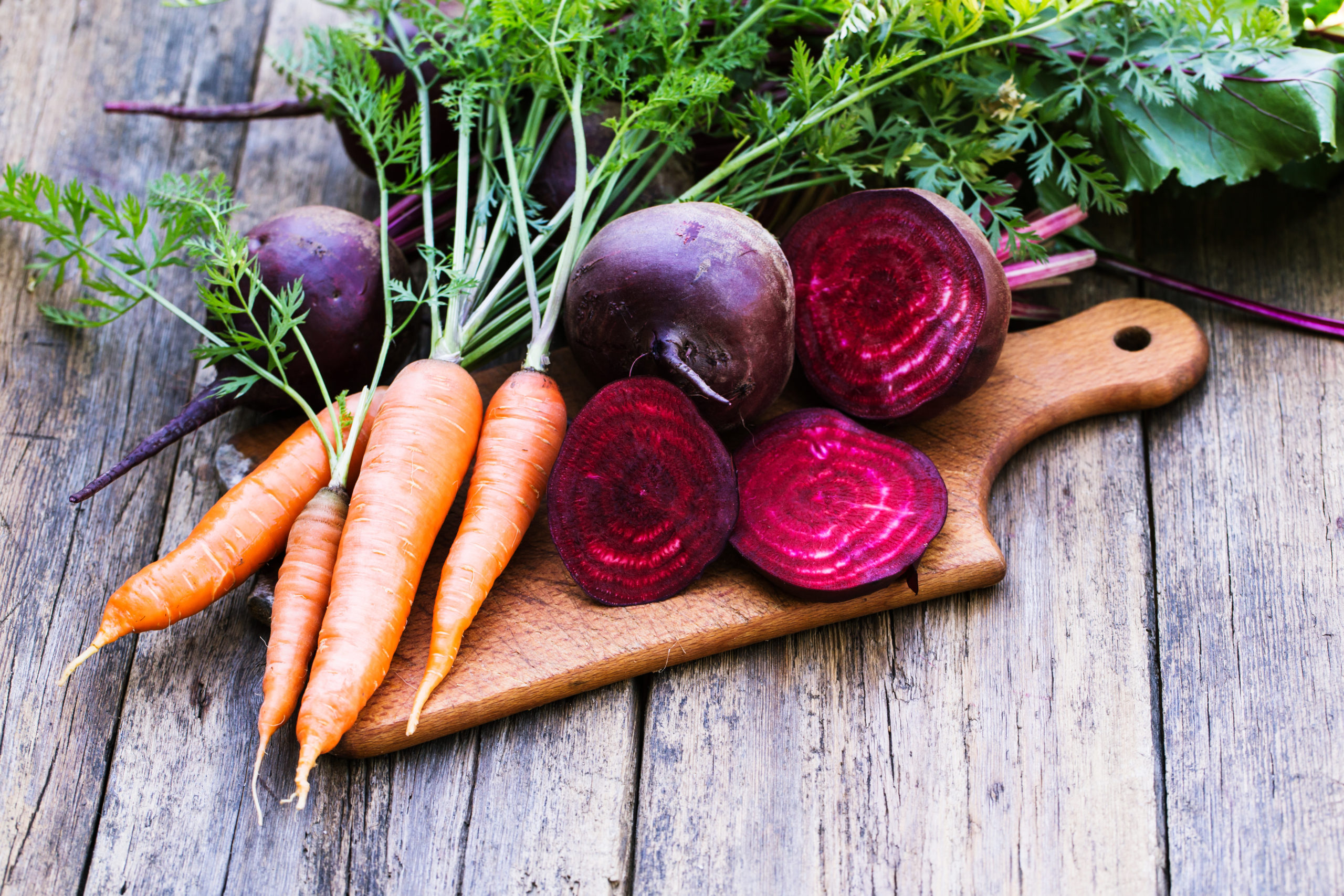How do you build the perfect diet to help your body heal & recover from cancer?
Personally, I believe this will look a bit different for everyone. Depending on your lifestyle, your food preferences, your cancer, your treatment plan, PLUS the suspected underlying imbalances that may have contributed to the cancer.
BUT there are some principles & foods that should absolutely be in everyone’s diet. As well as some foods & lifestyle habits that should NOT be there; like sugar, refined carbohydrates, processed meats, and bad fats…to name a few.
Today though we’re going to look at 10 of the most powerful foods you can add to your diet. Ten foods that can directly impact your body’s ability to target & remove cancer cells!
First, let’s review some of the overlying principles of every healing diet I recommend.
Principle 1: Plant Focused
Now this doesn’t mean I believe you need to be vegan or even vegetarian to help your body heal from cancer. What it does mean, is that most of what you’re eating is coming from plants. Ideally a colorful variety of plants (veggies, fruits, grains, legumes, herbs, spices).
Plants contain hundreds of different phytochemicals that can help your body prevent & heal disease. So unless you’re eating a lot of these foods, you will not be getting the powerful punch these nutrients provide. If you’d like to read more about the power of phytonutrients you can head here: A Rainbow of Color Is Your Best Medicine.
Principle 2: The Right Fats
I’m also not a believer that you need to follow a super low fat diet to help your body heal from cancer. I do believe that you want to fill up on the right ones. Fats that boost the immune system, lower inflammation, protect digestion, fight infection, and nourish your cells.
Again, these are mostly plant-based fats like avocado, coconut, olive, plus all the different nuts & seeds. This also includes the fat in wild fish & organic, pasture-raised animal foods. If you’d like to read more about healthy versus unhealthy fats you can head here: Eat More Fat.
Principle 3: High Quality Animal Food
Although most of the foods you choose each day should be coming from plants, there’s no reason animal foods can’t complement what you’re eating. However, the quality of these foods are incredibly important, so no skimping or short-cuts here.
Only choose animal products of the highest quality; organic, wild, pasture-raised. These factors actually change the nutritional profile of the food and is the difference between a nourishing healthy choice or an inflammatory and potentially disease promoting choice. You can read more about the debate between animal food and cancer here.
Principle 4: System Supporting
In addition to all the above, I also believe it is important to choose foods which will directly enhance and support your body’s cancer fighting systems. The systems which are essential in keeping you healthy and cancer cells in check.
These include your Immune System, Detoxification System, and Digestive System. You can read more about why I feel these systems are important HERE plus the exact steps you can take to improve each one of them.
10 Powerful Cancer Fighting Foods
Now, in the midst of all those wonderful foods listed above, there are certain ones which rise to the top when it comes to their ability to prevent & target cancer. Foods which have historically been used to heal the body as well as have the research to support their effectiveness. Let’s take a look at each one in more detail. And by the way, they are in no particular order. They are ALL amazing!
1. Cruciferous Veggies
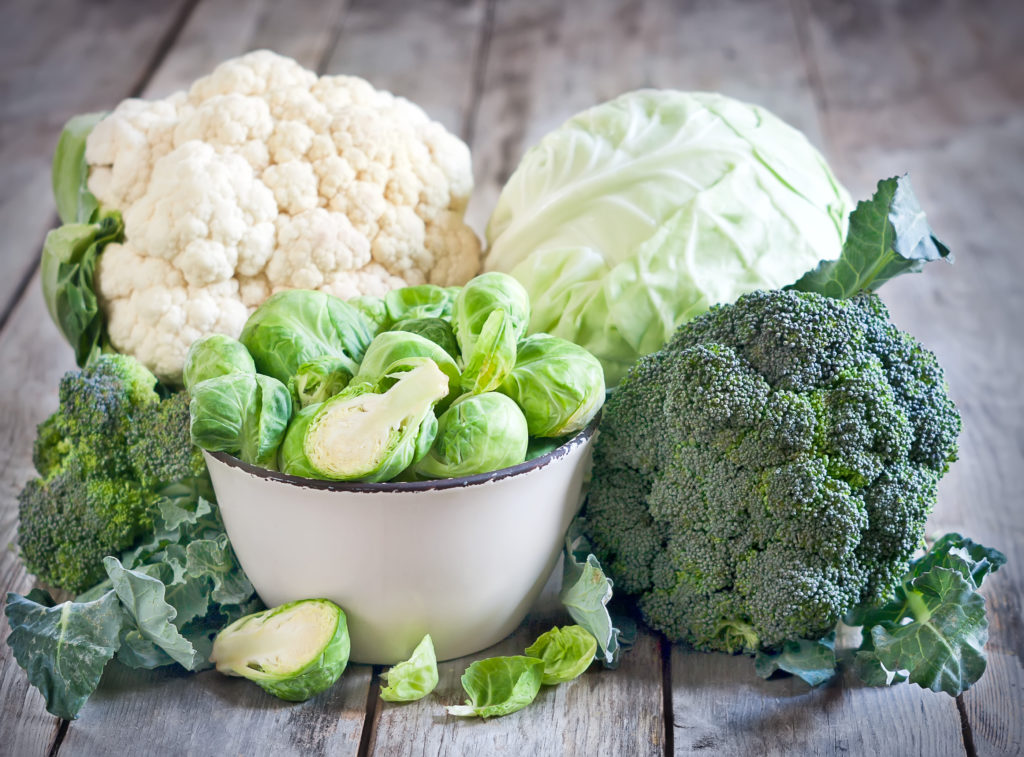
What Are They
broccoli, cauliflower, cabbage, collard greens, kale, Brussels sprouts, radishes, turnips, bok choy, kohlrabi, watercress, arugula, rutabaga, daikon, horseradish
Why Are They Important
Cruciferous vegetables are probably the food that contain the largest variety of phytonutrient compounds with anti-cancer activity. One group of compounds in particular are the Glucosinolates. These break down into isothiocyantates & indoles (ie. sulforaphane, indole-3-carbinol), which both possess high anti-cancer activity. Here’s a list of some of the many amazing benefits from these compounds.
- Accelerates the body’s ability to flush out toxic substances linked to the development of cancer
- Triggers apoptosis (cell death) in cancer cells
- Has antibacterial properties, especially against H. pylori (the bacteria responsible for gastric ulcers & increases the risk for stomach cancer)
- Inhibits tumor blood vessel formation (angiogenesis) and tumor cell migration (needed for metastasis).
- Reduces estradiol’s ability to promote cell growth
Want to read more about Cruciferous Veggies & Cancer? (1, 2, 3, 4)
Eat More!
Try to get at least 1 cup of cruciferous veggies in your body every day! And in order to maintain the maximum amount of anticancer activity cook them as little as possible, in a minimum amount of liquid, and chew really well to activate the enzymes.
- Add broccoli sprouts to your salads or sandwiches
- Roast a batch of broccoli, cauliflower, or brussels sprouts to add to your meals during the week
- Add sauerkraut (cabbage) to your salads, sandwiches, and meals
- Mix up your greens with kale, collards, bok choy, arugula, & watercress
- Shred different types of cabbage in your salads or combine to make a homemade “slaw”
- Use cauliflower as a substitution for “rice”, mashed “potatoes”, or even pizza “crust”
- Add them to your fresh veggie juice
2. Alliums
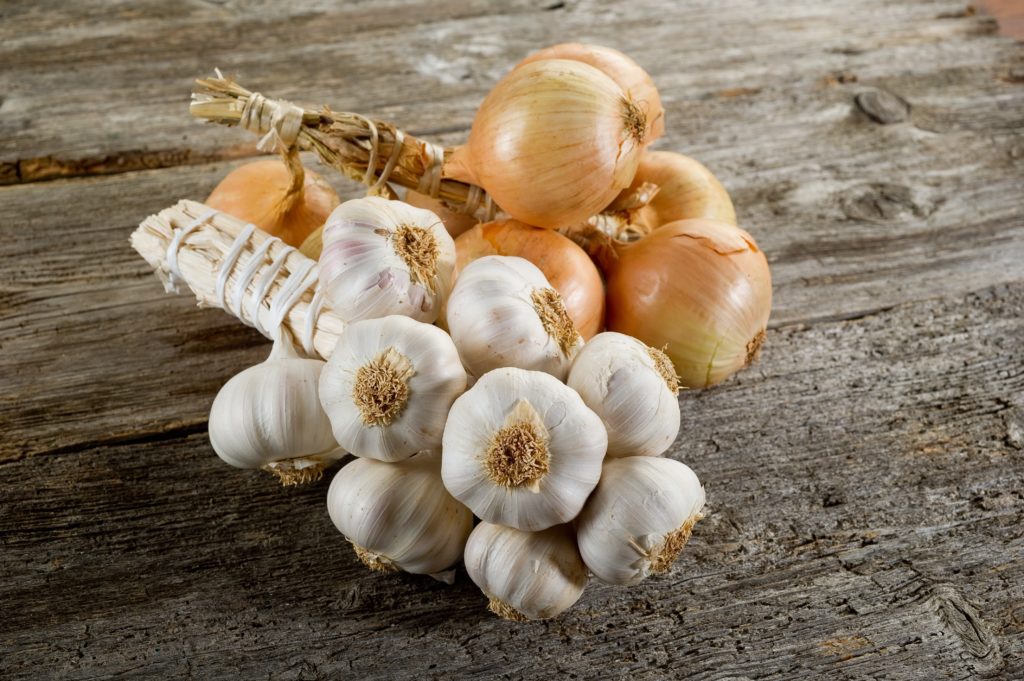
What Are They
garlic, onions, shallots, leeks, chives, scallions
Why Are They Important
Garlic & other alliums have the most historical reference to their use in medicine & disease management by ancient civilizations. In 1858, Louis Pasteur first demonstrated garlic’s powerful antibacterial activity. The sulfur compounds in alliums are responsible for most of their anti-cancer activity. Although the presence of flavonoids and inulin also play a role.
- Blocks the formation & stops activation of cancer-causing substances; especially nitrosamines caused by consuming nitrites
- Enhances DNA repair
- Prevents cancer cell growth and reduces spread
- Induces cancer cell death (apoptosis)
- Fights microbial infections
- Supports detoxification by boosting glutathione production
- Stimulates production of natural killer cells to enhance immunity
- Provides food for your good gut bacteria
Want to read more about Alliums & Cancer? (1, 2, 3, 4)
Eat More!
Try to get at least 1 clove or 1/4 cup serving of alliums in your body every day! Raw or very lightly cooked preparations will have more medicinal value than cooked, while freshly pressed/crushed garlic probably contains the highest amount of anti-cancer activity. Before cooking with alliums, ideally crush or chop and then let sit for at least 10 minutes to allow the allicin to develop.
- Add fresh garlic or shallots to your salad dressings
- Always include 1 allium as the base of anything cooked; even if the recipe doesn’t call for it you can often add it in
- Add 1 clove of garlic to your fresh veggie juice
- Roast a whole head of garlic in your oven & then add to meals or eat on its own
- Enjoy pickled as a condiment to your meals
- Fill the inside of a roast chicken with garlic cloves and enjoy with your meal.
3. Leafy Greens
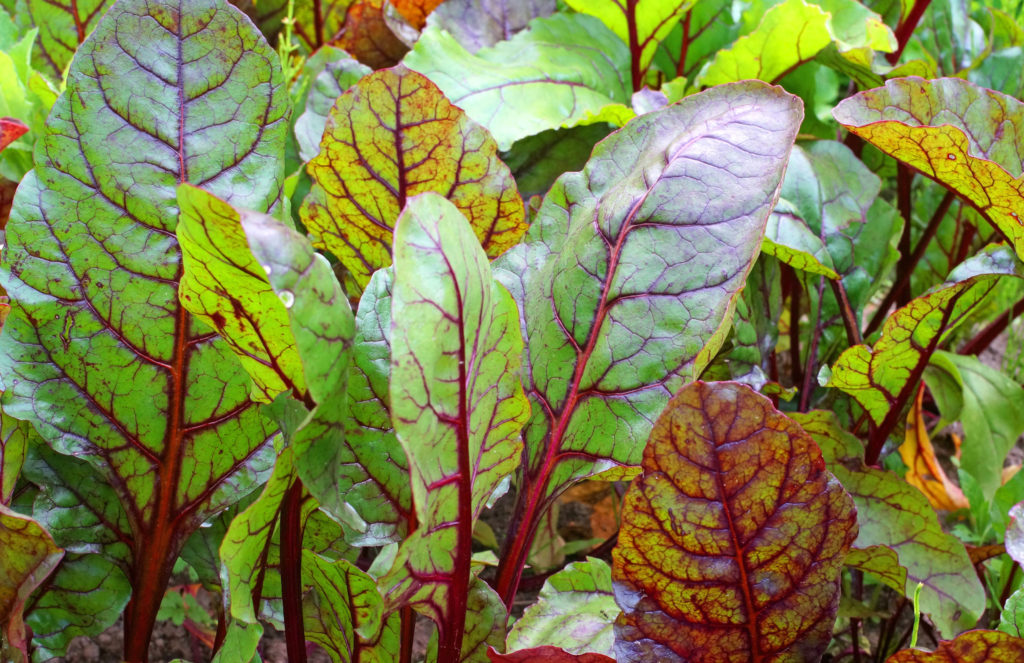
What Are They
spinach, swiss chard, kale, mustard greens, collard greens, bok choy, beet greens, arugula, watercress, mache, dandelion leaves, romaine, broccoli rabe, escarole, turnip greens, parsley
Why Are They Important
Most of the benefit of dark green leafy veggies come from their high content of carotenoids (specifically lutein & zeaxanthin) along with saponins and flavonoids.
- Neutralizes free radicals preventing them from causing DNA damage
- Boosts the immune system
- Suppresses cancer cell growth
- Stimulates cancer cell death
- Lowers inflammation
- Inhibits angiogenesis
- Supports detoxification
- Repairs DNA & stimulates production of new cells
Want to read more about Leafy Greens & Cancer? (1, 2, 3, 4, 5)
Eat More!
Try to get at least 1-2 cups of greens in your body every day! Mix it up with raw & cooked as both provide different benefits.
- Include a salad at least once a day
- Include a serving of steamed or sauteed greens once a day
- Add fresh greens to your smoothies or juices
- Add a handful of greens to your sauces, stews, or soups right before serving
4. Beets
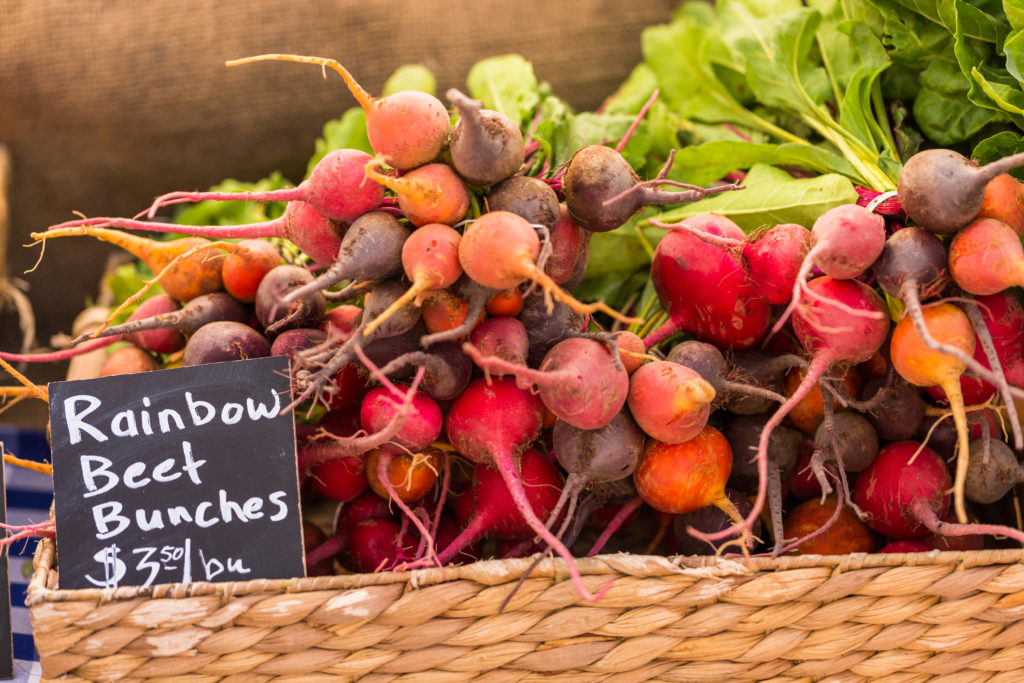
What Are They
red, golden, chioggia
Why Are They Important
All beets are a great source of antioxidants, folate, carotenoids, flavonoids, and other phytonutrients. Red beets are especially high in one phytonutrient with a lot of anti-cancer activity; betalaine which gives them their red color.
- Initiates DNA repair
- Neutralizes free radicals to prevent DNA damage
- Inhibits carcinogen formation
- Increases production of immune cells and enzymes that help fight cancer development
- Inhibits cancer cell growth
- Lowers inflammation
Want to read more about Beets & Cancer? (1, 2, 3)
Eat More!
Try to get at least 1 beet root (or 1/2 cup chopped) in your body every day! For maximum nutrient availability don’t overcook. Ideally a blend of raw & cooked is great.
- Add to your fresh veggie juice or smoothie
- Grate on your salads and nourish bowls or add to your sandwiches
- Roast or lightly steam and toss in a salad or add as a side dish to any meal
5. Carrots
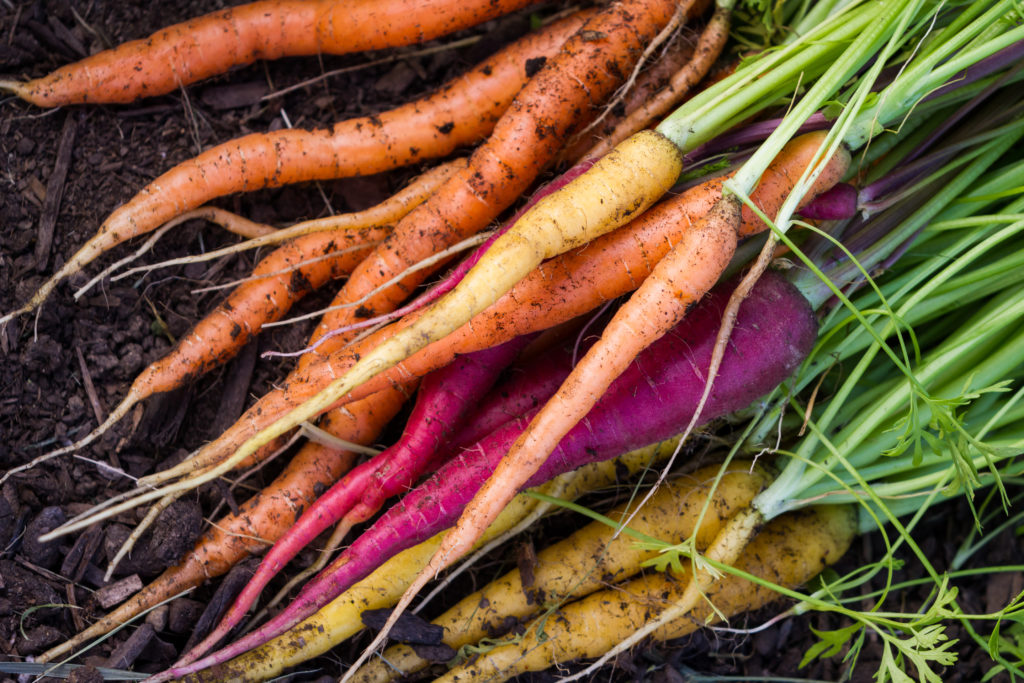
What Are They
orange, purple, red, white, golden
Why Are They Important
All carrots are a great source of carotenoids; particularly beta-carotene, which is a precursor to Vitamin A. They also contain luteolin, folcarinol, & hundreds of other phytonutrients. One such phytonutrient is anthocyanin, which is high in purple carrots.
- Boosts immune system
- Activates proteins that inhibit cancer cells
- Lowers inflammation
- Normalizes cell division
- Protects cell membranes from damage by toxins
Want to read more about Carrots & Cancer? (1, 2, 3, 4)
Eat More!
Try to get at least 1 carrot (or 1/2 cup chopped) in your body every day! Cooked carrots deliver higher concentrations of antioxidants but raw carrots protect some of the more fragile phytonutrients, like falcarinol. So ideally a mix of both is great.
- Roast them whole or chopped and add to your nourish bowls or serve as a side to any meal
- Grate and add to salads, sandwiches, or sauces
- Add to your juices or smoothies
- Add to soups & stews
- Enjoy raw as a snack with hummus
6. Mushrooms
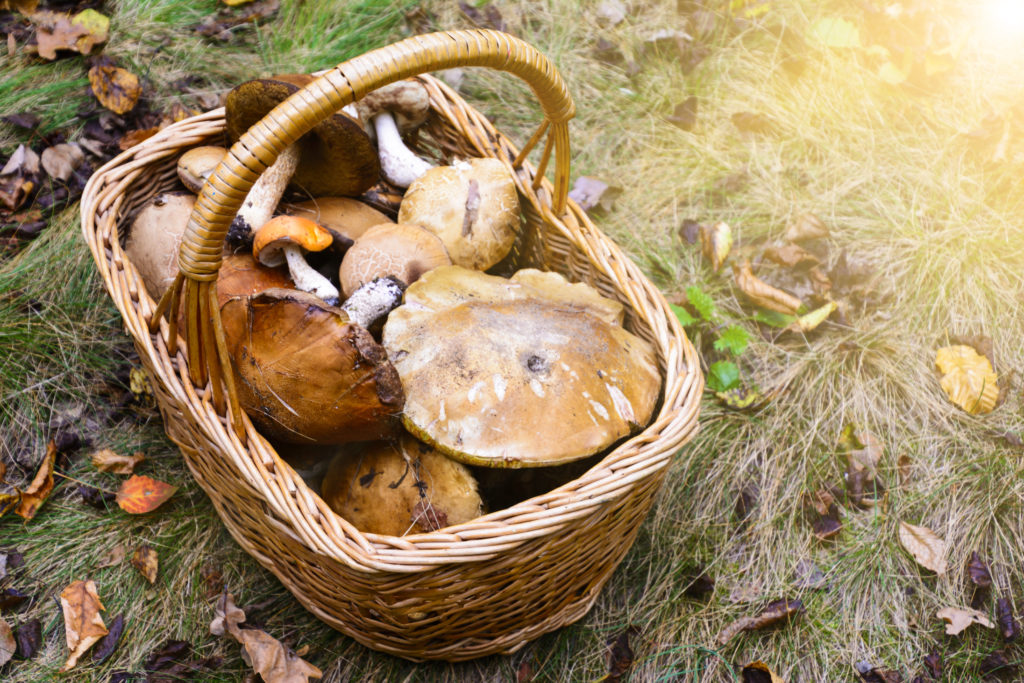
What Are They
white button, crimini, portabello, shiitake, maitake, oyster, enoki, beech, king trumpet (boletus), black trumpet (black chanterelle), chanterelle, hedgehog, morel, porcini (bolete, cepes), lion’s mane, reishi
Why Are They Important
All mushrooms are a great source of beta-glucan polysaccharides, lectins, & glycoproteins.
- Protects cells from free radical damage
- Inhibits angiogenesis
- Repairs DNA
- Induces apoptosis
- Boosts the immune system
- Protects against metastasis by preventing growth & division of cancer cells
- Inhibits aromatase; which produces estrogen
- Shrinks tumors
- Reduces side effects of chemotherapy & radiation
- Provides food for good gut bacteria
- Plus it is one of the only food sources of vitamin D
Want to read more about Mushrooms & Cancer? (1, 2, 3, 4)
Eat More!
Try to get at least 1 mushroom in your body every day! Only eat mushrooms cooked in order to destroy a toxin that is naturally found in mushrooms. Cooking also helps break down the fiber in mushrooms for easier digestion and better absorption.
- Sautee or grill mushrooms and add to eggs, sauces, whole grains, or meat dishes
- Grill portabellos and use in place of meat for burgers or other sandwiches
- Add to soups and stews
- Add to stir-frys or pasta dishes
- Add mushrooms as a supplement — some mushrooms are not as well suited for cooking (like turkey tail, cordyceps, chaga) but have incredible medicinal properties and can still be part of your “diet” by taking them in supplement form. You can read more about Mushrooms and the other supplements I think all cancer patients should consider HERE.
7. Berries
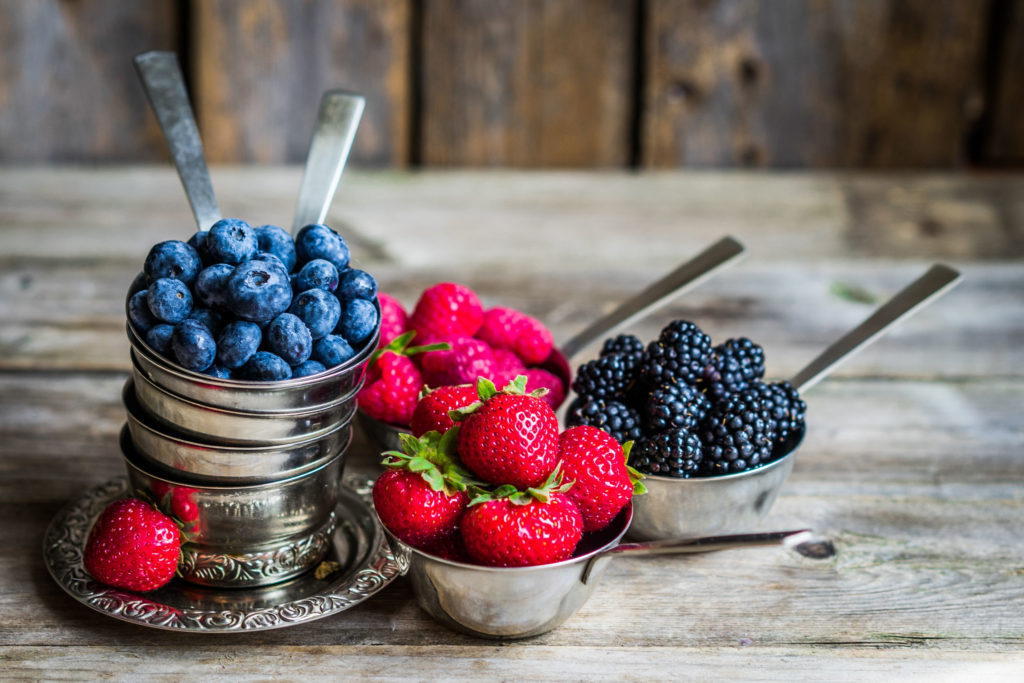
What Are They
strawberry, raspberry, blackberry, blueberry, boysenberry, cranberry, currant, acai berry, amla (indian gooseberry), elderberry, goji berry, huckleberry, bilberry
Why Are They Important
Berries are an excellent source of antioxidants, as well as ellagic acid, flavonoids, anthocyanins, & many other phytonutrients.
- Extracts of berry shown to slow cancer growth
- Increases enzymes which destroy cancer causing substances
- Suppresses enzymes that damage DNA
- Stimulates apoptosis
- Lowers inflammation
- Inhibits metastasis & angiogenesis
- Decreases cancer gene expression while turning on tumor suppressor genes
Want to read more about Berries & Cancer? (1, 2, 3, 4, 5)
Eat More!
Try to get at least 1 cup of berries in your body every day! Since all berries are great and some have slightly different benefits than others, your best approach is to try and get as much variety as possible.
- Berries make the perfect end to a meal; on their own OR sprinkled with dark chocolate shavings (yum!)
- Add to smoothies or juices
- Add to salads, hot cereal, or whole grain dishes
- Enjoy fresh as a snack
8. Citrus
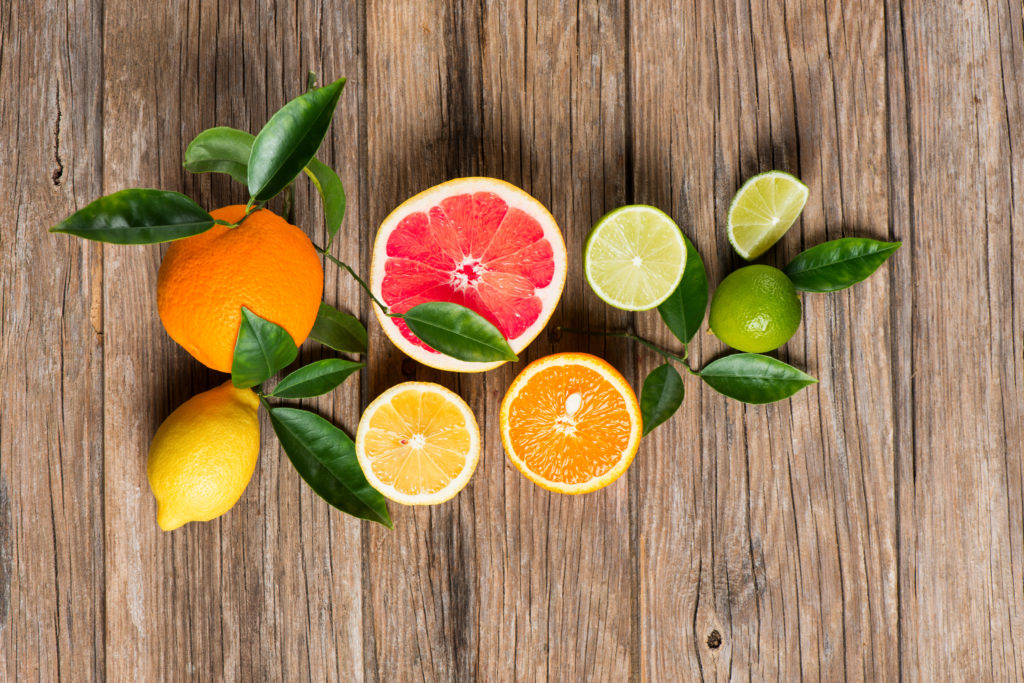
What Are They
oranges, lemons, limes, grapefruit, tangerines, blood oranges
Why Are They Important
Citrus fruits are also a great source of antioxidants, along with polyphenols, terpenes, flavonoids, pectin, & limonene.
- Lowers inflammation
- Increases enzymes that deactivate carcinogens
- Inhibits aromatase, which stimulates estrogen production
- Protects DNA from damage
- Inhibits cancer cell growth & reproduction (metastasis)
- Inhibits angiogenesis
- Supports detoxification pathways
- Contains antimicrobial properties
Want to read more about Citrus & Cancer? (1, 2, 3, 4)
Eat More!
Try to get at least 1 serving of citrus in your body every day! As with berries, mix up your sources. They all have slightly different benefits, so try to get as much variety as possible. Also, don’t neglect the peel of citrus fruits; this is where much of the anti-cancer activity lives.
- Grate the peel & add to smoothies, salads, and other dishes
- Juice the whole citrus fruit (peel included)
- Enjoy as a snack or dessert or sliced and added to salads or whole grains
- Use citrus juice in place of vinegar in your homemade salad dressing
- Add citrus essential oils to your water, in your massage oil, in your bath, or in your aromatherapy diffuser
9. Spices
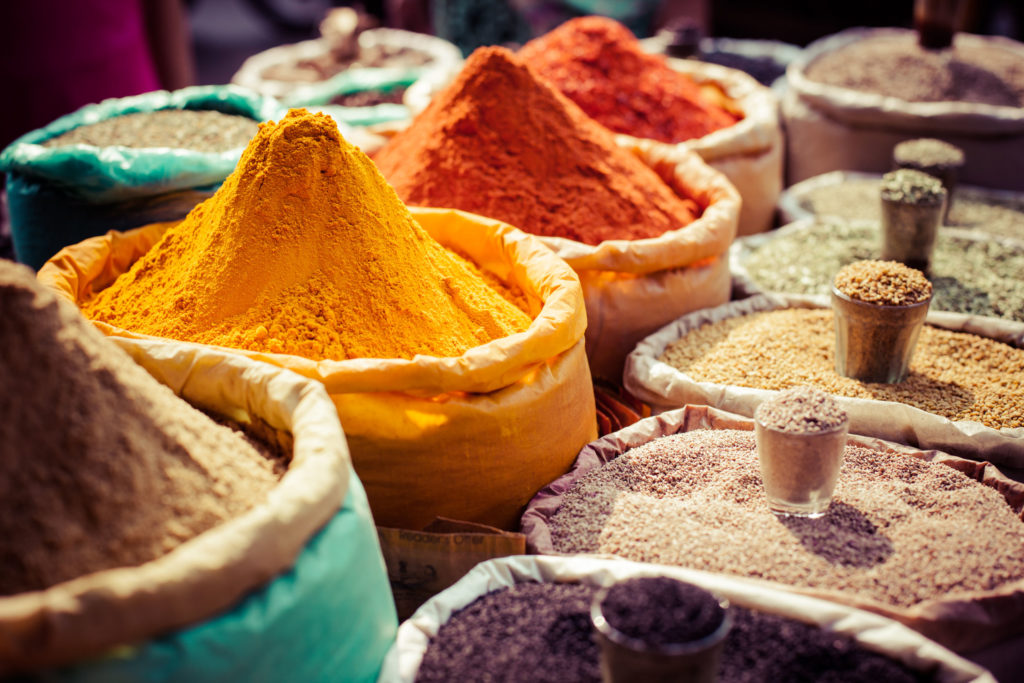
What Are They
turmeric, ginger, cinnamon, cayenne, rosemary, oregano, black cumin, saffron, black pepper
Why Are They Important
I talk all about the amazing health benefits of Spices in this article HERE. But really it’s the abundance of phytonutrients & antioxidants found in spices that make them so special.
- Fight infections
- Protects DNA from damage
- Boosts the immune system
- Lowers inflammation
- Suppresses survival, proliferation, invasion, & angiogenesis of tumor cells
- Inhibits the formation of tumor cells
- Activates apoptosis
- Sensitizes cancer cells to chemotherapy & radiation
Want to read more about Spices & Cancer? (1, 2, 3, 4, 5)
Eat More!
Try to get at least 1 tsp of spices in your body every day, but even better at every meal! Fresh and dried will both provide benefits; so mix it up.
- Add fresh spices to your juice or boil in hot water for tea
- Add fresh or dried spices & herbs to your smoothies
- Add fresh & dried herbs to your salads, nourish bowls, & whole grains
- Add ground cinnamon to your yogurt or hot cereal
- There really isn’t any meal that couldn’t benefit from adding some spice to it; to help with inspiration check out the many different recipes on my blog or in my cookbook “The Cancer Diet Cookbook“.
10. Green Tea
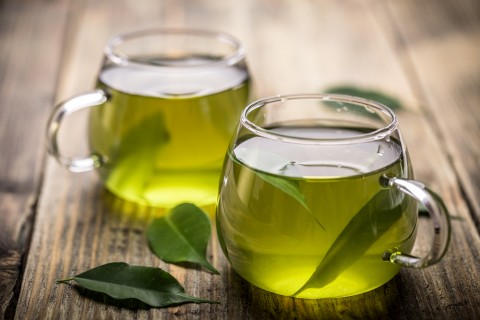
What Are They
sencha, gyokuro, tencha, matcha, hojicha, kukicha
Why Are They Important
Green tea contains antioxidants and catechins; the most well-known being EGCG (epigallocatechin gallate). They also contain flavonols & l-theanine.
- Protects DNA from damage by free radicals
- Inhibits development of cancer
- Stimulates enzymes that shut down carcinogens
- Decrease tumor growth
- Increases self-destruction of cancer cells (apoptosis)
- Inhibits the spread of cancer cells (angiogenesis)
- Activates detoxification enzymes
- Modulates the immune system
Want to read more about Green Tea & Cancer? (1, 2, 3, 4)
Drink More!
Try to get at least 3 cups of green tea in your body every day! The highest polyphenol & catechin concentration is found in freshly brewed tea; ideally Japanese green tea. Sencha is the highest. Brewing longer may also result in higher polyphenol concentrations; aim for 8-10 minutes if you can tolerate the taste (personally I love the more astringent flavor).
- Sip on green tea between meals
- Add green tea to other teas (this works well if you don’t like the flavor)
- Add green tea powder (matcha) to smoothies or fresh juices
Take The First Step
After learning about all the powerful actions these foods have in your body, I hope you are as excited as I am to take full advantage of them!
Food really is your medicine. And when you fill your body with an abundance of these healing foods, your body will have everything it needs to recover from cancer and prevent it from coming back.
Start by taking a look at what your current diet looks like. How close…or far away…is it to the above goals? Are you including those foods every day or at the very least every week? The amounts aren’t actually that crazy; it’s more the intention of making sure you’re choosing all those things on a regular basis.
Overall, are you focusing more on plants and less on animal foods? Are you anywhere close to getting the recommended 10 servings (or 800g) of total fruits & veggies every day?!
Don’t beat yourself up if you’re not there yet. Honestly, most of us aren’t. But you can definitely work towards those goals and gradually start adding more and more of these healing foods into your diet every day.
Let’s summarize, here’s what we’re aiming for each day:
- 1 cup cruciferous veggies
- 1 garlic clove or 1/4 cup onions, shallots, or leeks
- 1-2 cups leafy greens
- 1 beet root
- 1 carrot
- 1 mushroom (really!)
- 1 cup berries
- 1 piece of citrus fruit
- 1 tsp spice
- 3 cups green tea
- (and the harder one) 8-10 servings of total veggies & fruit
You Can Do It!! I know you can. Just start with wherever you are and build from there. Your body will thank you.
If you’d like the support of a trusted professional and you’re ready to start designing YOUR ideal Cancer Recovery Diet, the first step is to book a Free 20-min “Strategy Session” where we will review your diet, your lifestyle, and your cancer treatment plan and begin to map out your best recovery strategy.
Click here to book a 20-minute “Cancer Recovery Strategy Session”
